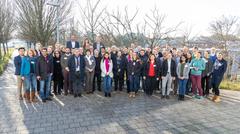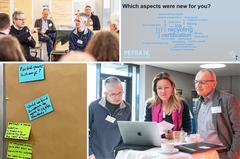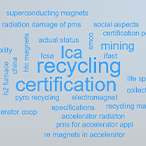URL: https://www.desy.de/news/news_search/index_eng.html
Breadcrumb Navigation
DESY News: Environmentally responsible research: DESY holds first workshop on critical materials
News
News from the DESY research centre
Environmentally responsible research: DESY holds first workshop on critical materials
Is it possible to use the expression “conservation of resources” unashamedly in the same sentence as “magnets”? What is the recycling potential of permanent magnets? And is a sustainable supply chain management of magnets and the certification of critical materials possible? Realistic approaches to solving such big questions were discussed during a 3-day workshop as part of the I.FAST (Innovation Fostering in Accelerator Science and Technology) project at DESY.
New ideas, progressive perspectives: The first workshop of this kind initiated by DESY was entitled “Critical Materials and Life Cycle Management: The Example of Rare Earths – Curse or Blessing?”. More than 50 international guests attended, including the English expert in permanent magnets Ben Shepherd, researchers and specialists from large-scale research centres and universities, recycling and certification pioneers, manufacturers of magnets and representatives from the Federal Ministry of Education and Research and the Federal Institute for Geosciences and Natural Resources.To anticipate the outcome: “An awareness has been created. There is also a resolve to use permanent magnets more sustainably in research,” said Denise Völker, head of DESY's Interdivisional Department for Sustainability and initiator of the workshop which was funded by the EU Horizon2020 programme. “As research centres, we need to act concertedly in the future!”
The backdrop is that the worldwide demand for magnets (e.g. for the car industry, wind turbines, computers and mobile phones) is due to increase significantly over the coming years. Large research centres such as DESY also use magnets to operate their accelerators. In order to minimise the energy consumption of these large-scale devices, the trend is to move from electromagnets to permanent magnets, also at DESY. The disadvantage of such magnets is that they contain rare earths, most of which are imported from China and are associated with massive ecological and social problems. The same applies to the element cobalt, whose extraction is also viewed highly critically in this respect.
“As scientists, we have a social responsibility. And workshops like this help us to make the right decisions,” said Wim Leemans, Director of DESY’s Accelerator Division, at the start of the event. Possible solutions include recycling and creating sustainable supply chains for permanent magnets.
Jürgen Gassmann from Fraunhofer IWKS pointed out the existing problems with recycling magnets: on the one hand, the way magnets are usually installed is too complicated, and on the other hand, re-use is still not economically viable because too little recyclable material is available. Carlo Burkhardt from the Pforzheim University of Applied Sciences added that it is currently cheaper to import new raw materials from China and called for recycling to be taken into account during the production process.

The international experts met for three days at DESY. Photo: DESY, Marta Mayer





